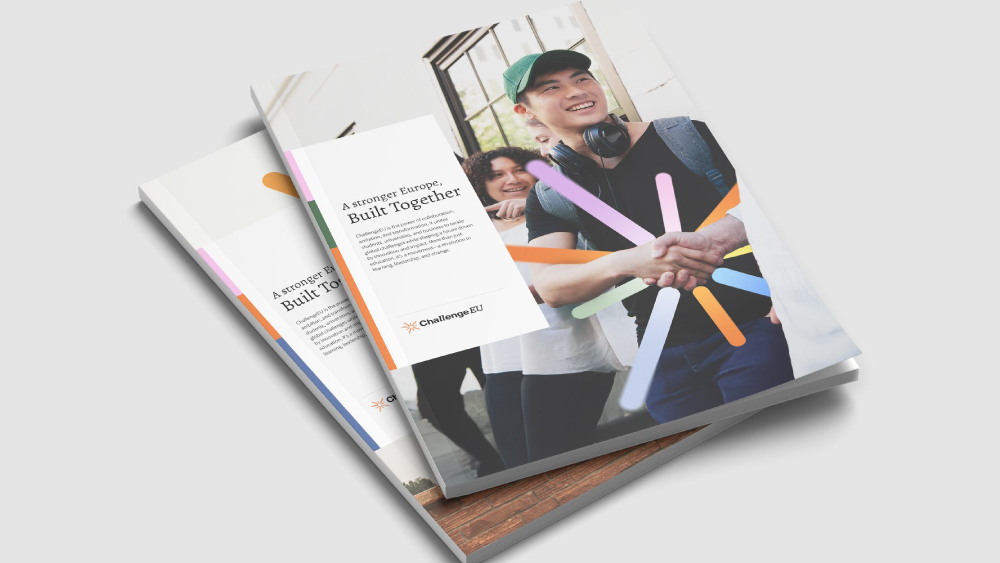ChallengeEU alliance

Cultivating Holistic Sustainable Collaborations: Engaging Excellence in European Universities
The European Universities alliances are a flagship initiative of the European strategy for universities. It's a cooperative of universities of the future, connecting a new generation of Europeans and enabling them to study and work in different countries, languages, academic sectors and disciplines. UWM, together with eight partner universities, forms the ChallengeEU alliance.
In October, the final signature was placed on the agreement with the European Commission. As a result, the ChallengeEU – project, which representatives of nine universities – has been working on for a long time, will begin in January 2025.
A EUROPEAN PROJECT FOR THE FUTURE
European Universities are ambitious transnational alliances of higher education institutions that develop long-term structural and strategic cooperation based on shared values and agreed principles. The aim of this initiative is to educate a new, cooperative generation of Europeans and to build a strong identity based on European values.
European universities are also intended to strengthen the quality of higher education and its connection to the socio-economic environment. This cooperation is expected to result in a new quality of research and innovation across Europe, benefiting both society and the economy.
THE ROAD TO THE ALLIANCE
In the competition, which closed in June, 60 international consortia applied to become a European University Alliance. Only 14 were selected to receive funding for their activities. Each alliance has a maximum budget of €14.4 million (over four years). Joining the project also makes it easier to attract further funding from international programmes.
The universities in the ChallengeEU alliance have been cooperating for approximately 1.5 years. During this time, intensive work on the project was underway. The first relations between the partner universities were established through online and face-to-face working meetings. At UWM, representatives of several units were responsible for the project, including the Office of International Cooperation, the Marketing and Media Center and some faculties. The supervisor was Prof. Paweł Wielgosz.
In September, Prof. Jerzy Przyborowski and Prof. Paweł Wielgosz met with the rectors of all universities in the ChallengeEU alliance at the University of Lisbon. This was the last meeting before signing the agreement with the European Commission.
- Together with the consortium partners, we discussed how we would make decisions and monitor the impact of the project (both within the universities and between universities). We also defined the stages of our meetings, at which we would discuss the implementation of what is, to be honest, quite a complicated project - says Prof. Jerzy Przyborowski, Rector of UWM. - During our stay in Lisbon, we also discussed the project’s budget. We devoted a lot of time and attention to the management structure and the roles that each university will play in the consortium.
It is important to note that Hochschule Offenburg is the project leader, and UWM is the vice-leader.
– The governance of this project at different levels has been established. The strategic level is first and foremost a strategic council, which will include all rectors and representatives of the student community – explains Professor Przyborowski.
Students will also be involved in the activities of the Alliance by forming a Student Council. Representatives of each university will be nominated by the rectors. The role of these councils will be to monitor the implementation of the strategy of the whole project and to correct it if necessary.
– The second level of the organisational structure concerns project management. The main role is played by the lead institution, the University of Applied Sciences Offenburg, headed by Professor Anna Najderek, Vice-Rector of the University of Applied Sciences Offenburg, supported by the relevant offices – explains Professor Jerzy Przyborowski. – The structure also includes a coordination and support office for all the universities. There will also be an office at each university. This will be responsible for specific tasks, including project promotion and communication between partners.
COOPERATION FULL OF BENEFITS
International partnership is a great opportunity. The ChallengeEU alliance offers University of Warmia and Mazury in Olsztyn many new opportunities. Firstly, UWM students and postgraduates will be able to continue their studies not only in Poland, but also at the partner universities and develop their knowledge and specific skills. Secondly, the universities in the Alliance agree to organise courses that will enable students to acquire additional competences that will be certified. Thirdly, both students and staff will participate in study trips, which will allow them not only to gain new experiences but also to develop networks.
Fourthly, the joint initiative will aim to highlight key contemporary challenges, including equality issues, so that all partners are involved in developing solutions to build inclusive academic communities. The fifth important element will be collaborative research, which will certainly have an impact not only on the research potential of the university, but also teaching. Students will have the opportunity to participate in large international projects and attend courses taught by lecturers from different universities. Sixthly, the participating universities want to strengthen cooperation with business, local government and non-governmental organisations. This is also important information for students, who will have the chance to get much closer to their potential workplaces during their studies.
The ChallengeEU alliance is also involves working with the socio-economic environment. One of the key objectives was to attract partners from business, local government and NGOs. In total, there are 94 units from nine countries across Europe.
All universities have unique innovation strategies in teaching, research and knowledge transfer, combined with extensive experience in working with a wide range of institutions and companies. Partners are committed to the sustainable development of their societies and the region. With some 83,000 students and 9,000 staff, the ChallengeEU Alliance will support social, economic and technological innovation that will impact the lives of some 25 million citizens.
European Universities are ambitious transnational alliances of higher education institutions developing long-term structural and strategic cooperation based on shared values and agreed principles. The goal of this initiative is to educate a new, collaboration-oriented generation of Europeans and to build a strong identity based on European values. European Universities also aim to enhance the quality of higher education and strengthen its connections with the socio-economic environment. This cooperation will result in new quality of research and innovation across Europe, benefiting society and the economy.
In total, there will be 64 consortia operating under the banner of European Universities, comprising 560 higher education institutions from 35 countries, including all EU member states, as well as Iceland, North Macedonia, Norway, Serbia, Switzerland, and Turkey, along with Albania, Bosnia and Herzegovina, and Montenegro.
- Hochschule Offenburg (Offenburg, Germany) – coordinator of the consortium
- SEEU -South East European University (Tetovo, North Macedonia)
- ECAM LaSalle (Lyon, France)
- Mid Sweden University (Sundsvall, Sweden)
- Universidade Europeia de Lisboa (Lisbon, Portugal)
- University of Warmia and Mazury in Olsztyn (Olsztyn, Poland)
- LBTU - Latvia University of Life Sciences and Technologies (Jelgava, Latvia)
- Universidad Europea de Valencia (Valencia, Spain)
- University of Applied Sciences Northwestern Switzerland (Brugg-Windisch, Switzerland) as Associated Partner

- Transforming Regional European Universities: The focus is on transitioning from a "topic-driven" to a "challenge and impact-driven" approach in research, education, and innovation. The alliance will establish the ChallengeEU Academy, which comprises three pillars: Teaching, Training, and Talent Academy. This academy supports professional development for students, staff, and partners, offering joint academic programs, entrepreneurial skills for researchers, and fostering societal relevance in study programs. Engaging external stakeholders, the academy promotes lifelong learning and reciprocal learning, enriching the open innovation processes within the alliance. It will offer flexible online courses, open-access resources, alternative credentialing options, a pilot joint degree, interdisciplinary joint programs, and multiple/double degrees.
- Advancing Partnerships for Academic Excellence: Utilizing Open Science and Open Innovation methodologies, ChallengeEU will introduce a new model of knowledge transfer Multi-Actor Research & Knowledge Exchange Teams (M.A.R.K.E.T.s), revolutionizing partnership between Academia and Quadruple Helix stakeholders. These will serve as vibrant hubs where students, researchers, and diverse stakeholders converge to collectively tackle challenges, share expertise, and drive transformative advancements within their respective domains.
- Promoting Inclusive Education: By eliminating barriers to education and learning, ChallengeEU ensures access to quality education for all. The alliance will create an Open, Diverse, and Inclusive Campus (ODEI) and develop ODEI Strategy and Policy at every partner university.
- Establishing an Innovative Inter-University Campus: Strengthening collaboration, fostering mobility, and enhancing intercultural and language competencies within the alliance (among students, academics, and administrative staff) will be prioritized. This will be supported by establishing robust IT infrastructure.
- Fostering Collaborative (Trans)Regional Innovation Ecosystem: The ChallengeEU Alliance aims to cultivate lasting cooperation with stakeholders from all areas of the Quadruple Helix. Within three Smart Specialization Areas—Health and Well-being (SDG 3), Smart Digitalization (SDG 9), and Sustainable Futures (SDG 13)—the innovative concept of M.A.R.K.E.T.s will emerge, fostering transdisciplinary collaboration, innovation, and the co-creation of solutions across digital, green, social, and sustainable dimensions.













